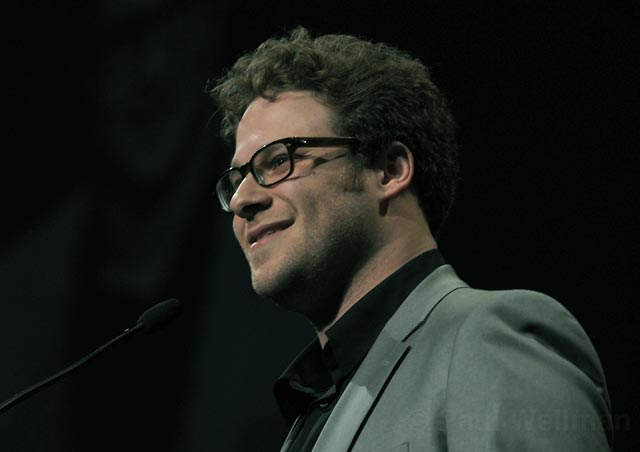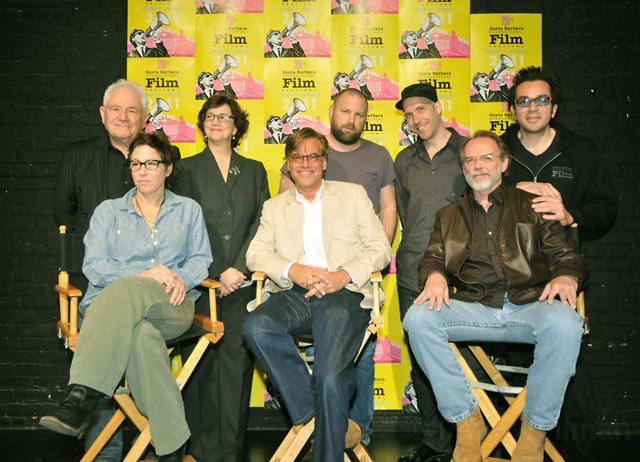Saturday Film Fest Report
160 Minutes with the Real (?) James Franco

“I’ve never seen a movie theater built inside of a Mexican restaurant before.” Thus saith Apatow-era comic force Seth Rogen, turning in one of the better riffs about Santa Barbara’s belovedly kitschy Arlington Theatre on Saturday night. Rogen was there to pay comical tribute to his friend and colleague James Franco, with whom he worked in TV’s cult fave Freaks and Geeks in their salad days and the stoner comedy Pineapple Express as more-or-less grown-ups.
Franco’s this-is-your-life tribute at the restaurant-like Arlington was, needless to say, a different kinda night with a different younger audience compared to the previous night’s fete for Annette Bening.
Watching his Oscar-wooing tour de force performance in 127 Hours, we had an unusually long, close, and claustrophobic encounter with our protagonist. But Franco, we hardly know ye, or the many aspects of ye. After spending time at the Arlington hearing him ramble and artfully dodge around with Leonard Maltin about his life and work, from a dizzy, chameleonic array of roles (Milk, the under-screened and nice try Allen Ginsberg film Howl, Eat, Pray, Love … ) to his restless attraction to higher education (he’s currently at Yale, which will forgive him for attending the Oscar ceremony), we realized how much of a moving high-low target he is, even to himself.
On his artistic trickster front, Franco has recently been working on an art-about-art-about-celebrity project, which led him to high and low quarters, bringing his ongoing cameo work on the soap opera General Hospital to MOCA. Maltin was about to show back-to-back clips of General Hospital and 127 Hours, and Franco quipped, “I hope they don’t get confused about which is which.” But the real laff-fest quips came at the end, courtesy of Rogen.
As usual, Saturday morning’s screenwriter’s panel discussion was a predictably hot ticket in a town, region, and planet buzzing with real and aspiring and optioned screenwriters. And as usual, given the proximity of Hollywood and the Oscars, plenty of the top writers in the news were sitting on the Lobero stage to gab about their trade and art, including Lisa (The Kids Are All Right) Cholodenko, Aaron (The Social Network) Sorkin, Scott (The Fighter) Silver, Michael (Toy Story 3) Arndt, and Charlie (Get Low) Mitchell. Those were some of the finer and more well-written and inventive films of the past year, no doubt.

But probably the star of the show this year, for unusual reasons, was the veteran writer David Seidler, who bust out and upward from the humble trenches (much as Sorkin, a former TV writer, did with Social Network) with his inspired script for The King’s Speech. It was a subject he was partly obsessed with because of his own early struggles with stuttering. Asked about the momentous Toronto Film Festival screening of the film, he admitted being stunned by the ovation and great response. “For the first time in my life as a stutterer,” he told the Lobero crowd, “my voice was heard.”
His voice was heard again loud and clear in the abbreviated audience Q&A, when a provocateur asked him about allegations that he was promoting an anti-Semite, as some have dubbed King George VI. Seidler was firm but clear, explaining that he had lost his grandparents in the Holocaust and that the “the suggestion that I would spend this much of my life to tell the story of an anti-Semite I find vile.”
On lighter notes, Sorkin spoke about his working process, confessing that the hard part is getting started. “The difference between page 2 and page 9 is huge,” he said, adding that the initial phase “is a little like walking around in the dark with a flashlight.” Cholodenko, for her part, spoke about the blending of spontaneity and the comforting structure of the “carding process.” “There’s something incredibly anxiety-producing about having no road map.”
And now, at least some of the panelists are on the Envelope map.
Canada has supplied a healthy dose of titles this year, especially via the return of the “Focus on Quebec” sidebar, from which A Life Begins (Michel Monty) is one of the surprising charmers. With its visual seductiveness, all vintage lighting and late ‘50s color schemes (echoes of Mad Men-ia), the film is a lustrous thing to watch, featuring a great performance by the young actor Charles Antoine Perreault. Ed Gass-Donnelly’s Small Town Murder Songs isn’t such a generally successful thing, a gothic murder saga in a Mennonite town in Ontario, which works up atmosphere and refreshing characters (such as a taciturn, haunted cop), but loses its way in the thinning thicket. Great, swampy gothic music, though.
As entertaining and quasi-insider-ish as the Hollywood component of SBIFF is, the real buzz for film geeks takes place in the “international” component, and this year’s roster is typically exciting, especially when you find the gems.
Two of the more heartwarming films of the program come from wildly divergent places, geographically and expressively. British director Justin Chadwick’s wonderful A First Grader is a wise and warm film, based on a true story, about an 84-year-old man in an elementary school in Kenya, after its independence — a feel-good film which also doesn’t shy away from the pain and tragic history of the country. Quirky Swedish jewel Simple Simon (Andreas Öhman) is a fizzily fun and moving and wittily stylized story of young zigzagging love between an Asperger’s teenager and his love-lorn brother, and the complex math between them.
Other film notes from the Metro 4 festi-plex: Spain’s Asleep in the Sun (Alejandro Chomski) is a hard-to-pigeonhole small wonder, a blithely crazy tale set in the ‘40s, wherein love of dogs and restless souls are subjected to a wonderfully, but understated, surreal scenario. Japan’s Patisserrie Coin de rue, directed by Yoshihiro Fukugawa, while long-ish, is a, ahem, sweet little film about the passion for the art of French pastries and the culture and business thereof.



